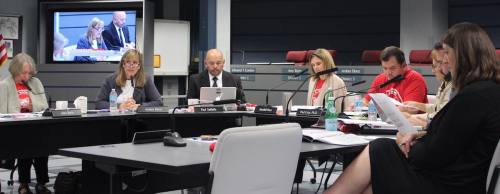A district classified as a District of Innovation adopts a plan that exempts it from certain state laws, including site-based decision-making, school start date requirements, minimum minutes of instruction, class size ratio, attendance rules, disciplinary procedures, teacher contracts and other legal requirements. Over the course of eight meetings, the committee, made up of 36 AISD parents, teachers and community members, analyzed feedback from principals and other staff members concerning which exemptions are most suitable for AISD.
"We are very proud that [forming exemptions] was a grassroots initiative driven by community members, not by administrators," said Raul Sanchez, principal of the Webb K-8 Academy and IDAC member.
IDAC member and Joslin Elementary Principal Jennifer Pace said that all possible exemptions were narrowed down to the four options the committee believed best represented their diverse interests. The committee modeled its exemptions after those sought after by other Districts of Innovation, including Round Rock, Maynard and El Paso ISDs.
- Exemption to adjust the first and last day of instruction: According to Pace, this would allot teachers additional days of planning and preparation at the start of the school year, allowing for flexibility in determining the last day of school. Without this innovation, districts are required under Texas law to prohibited from beginning the school year prior to the fourth Monday in August. Pace said flexibility in the calendar would enable breaks to be strategically designed to fall after grading periods.
- Exemption to allow for non-certified teachers to teach career and technical education pathways: Texas Education Code states that a public school teacher must hold a valid teaching certificate or permit issued by the State Board of Educator Certification. This exemption would seek to overrule that policy in favor of hiring field-based experts to teach career and technology, or CTE, and technology application courses to high school students. According to the draft plan, this would not only enhance field-based opportunity for students but would also save the district money by reducing the cost associated with hiring a certified teacher.
- Exemption to adjust minutes of instruction: This innovation would allow the district to occasionally shorten the school day to provide more time for teachers to plan, collaborate and prepare for instruction. According to the plan, this would reduce staff and student stress, anxiety, fatigue and absenteeism. The committee members pointed out that every AISD school currently meets or exceeds the 75,600 minutes of instruction required each school year by the Texas Education Code, so there is wiggle room to adjust instruction time.
- Exemption to adjust minimum attendance: Texas Education Code measures attendance through the percentage of "seat time," or the amount of time a student spends physically present in a classroom. The current law requires a student to meet 90 percent "seat time" for class credit. AISD's innovation would overrule the state's requirement to penalize students for absence due to extracurricular activities, academic activities, field-based experiences, distance learning activities or other extenuating circumstances. According to the plan, this aligns with the district's belief that class credit should be awarded based on content mastery, rather than time spent in the classroom.
While there was much support voiced for the draft plan, several trustees questioned whether there was an adequate mechanism in place to evaluate if the exemptions were sufficient in improving student outcomes.
"My only issue is that this puts a lot of pressure and expectations on the administration," trustee Edmund Gordon said. "You have to be prepared to regularly assess the innovations and allow those that do not work to die."
Trustee Ann Teich agreed that a more concrete accountability system was needed prior to implementation.
"While there is a lot of autonomy granted this is a lot of accountability still needing to be required," she said.
Members of the committee are scheduled to deliver the same presentation to the District Advisory Council tomorrow, March 21. During the March 27 regular board meeting, a public hearing will be held prior to a final vote by the trustees. If approved, the plan would be in effect from that date until March 27, 2022.





